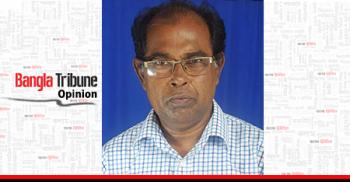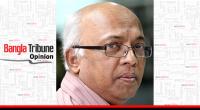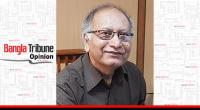 The name which hundreds and thousands of Bengalis have been keeping enshrined in the heart of their hearts since the onset of Bangladesh as an independent state on the global map and will never sink into oblivion --- and will be cherished by posterity is Bangabandhu Sheikh Mujibur Rahman, the father of the nation. Who can’t but be exceedingly curious about his birth, work and death and even though every detail of this legendary leader’s life is inexhaustible even for the best of biographers?
The name which hundreds and thousands of Bengalis have been keeping enshrined in the heart of their hearts since the onset of Bangladesh as an independent state on the global map and will never sink into oblivion --- and will be cherished by posterity is Bangabandhu Sheikh Mujibur Rahman, the father of the nation. Who can’t but be exceedingly curious about his birth, work and death and even though every detail of this legendary leader’s life is inexhaustible even for the best of biographers?
On the 17th March 1920, Sheikh Mujibur Rahman was born, his parents being Sheikh Lutfor Rahman and Shayera Khatun. This ordinarily born baby showed signs of his extraordinary potential. During his early school days at his village one-day young Sheikh Mujib returned home from his village school rain-soaked though he had an umbrella given by his father, he did not use it. The explanation was, he had an impoverished classmate who could not afford one and out of pity he gave it to him being regardless of his own need again, on a winter day on his way back home from school, and he gave away his wrapper to an old woman who was shivering by the roadside.
During his academic career in Gopalgonj Mission School, he did every possible task voluntarily round the clock to render humanitarian service to the marginalized Muslim students as a member of Muslim Sheba Samity. These acts speak volumes for his unfathomable love for poor people. Though a minor he blocked the path of Sher-e-Bangla AK Fazlul Haque with his unflinching courage. This indicated that he would be as towering as the Himalayas in the subsequent phase of his life.
With the passage of time as he and I attained physical maturity, he welcomed the sub-continental struggle against the British Colonialism that enslaved the nation for around two hundred years. Being a secularist, he moved to and fro in then undivided India seeking to maintain the brotherhood between the Hindus and the Muslims. Legacies of ideology, ethics, inspiration, doctrine etc. inculcated into him by political leaders like Hossain Shaheed Sohrawardy, helped him become a first-rate leader.
In the newly-emerged Pakistan when the West Pakistani rulers turned out to be the predators of his fellowmen contrary to their expectation, he challenged the rulers’ injustice, oppression, exploitation and dictatorial attitude quite boldly. He played a vital role in political developments of his time such as the language movement of 1952, the election of 1954, the six-point movement of 1966, the anti-Ayub uprising of 1969 etc. In an attempt to prolong their rule the Pakistani rulers incarcerated him again and again. He was imprisoned for 14 months in 1954 and for 1 year in 1965. Last but not the least; he had to endure nine months in the Pakistan jail as the worst part of his languishment.
At last on the 16th December 1971 with the rise of a new sun, a new flag fluttered in the sky ---- the bold new flag of an independent sovereign Bangladesh signifying the end of the oppressors’ domination.
Alas! An irreparable loss visited the nation as some brutal perverted army personnel swooped on him at his residence on the 15th August 1975 and killed him brutally, along with many other members of his family.
It goes without saying that what his killers were able to do was to kill him physically. They could not extinguish his noble spirit, for his noble deeds have immortalised him. He is an embodiment of large-heartedness, patriotism, nationalism, indomitable valour and uncompromising protestation against injustice.
Needless to say, in the sub-continent, he is an icon of secularism, peace, and harmony, ----- values which are a must for a happy nation. His philosophy, dream and doctrine reflected in his activities will be a perennial source of universal inspiration. The record of his achievements will be read by generation after generation at home and abroad. His speeches delivered on different occasions by way of guidelines for his people, especially his speech of 7th March, will remain forever to inspire future generations. Mujib’s persona implies an entity that will survive the test of time. In the days to come, Bengalis will tread his footprints imbibing his spirit.
The emancipation of the Bengalis would have remained as a mere dream but for the birth of this great figure. Hence, Bangladesh and Sheikh Mujib are said to have been co-related in such a manner that the former is impossible without the latter. The debt the nation owes to him is not repayable.
He has sailed away across the ocean of eternity. Yet, we can visualise him in every demonstration again tyranny of the despotic rulers. Our inner ear can hear his tremendous voice of protest against the violation of human rights. Even today, we can sense his proactive presence wherever there exist hunger, poverty, and the scream of the downtrodden. The bullets of the hyenas could kill Sheikh Mujib but not that Mujib who was the father of the nation. Therefore, we should turn even our condolence for him into a force which will enable us so we can go ahead to build a mighty Bengali nation as per his long-cherished dream.
Emdadul Haque is a lecturer of English in Moheshpur Government College, Jhenidah
 Opinion
Opinion
41364 hour(s) 31 minute(s) ago ;
Morning 07:25 ; Sunday ; Jul 06, 2025
Bangabandhu Sheikh Mujibur Rahman
Send
Emdadul Haque
Published : 20:06, Aug 13, 2018 | Updated : 20:39, Aug 13, 2018
Published : 20:06, Aug 13, 2018 | Updated : 20:39, Aug 13, 2018
0 ...0 ...
/ab/hb/
***The opinions, beliefs and viewpoints expressed in this article are those of the author and do not reflect the opinions and views of Bangla Tribune.
- KOICA donates medical supplies to BSMMU
- 5 more flights to take back British nationals to London
- Covid19: Rajarbagh, Mohammadpur worst affected
- Momen joins UN solidarity song over COVID-19 combat
- Covid-19: OIC to hold special meeting
- WFP begins food distribution in Cox’s Bazar
- WFP begins food distribution in Cox’s Bazar
- 290 return home to Australia
- Third charter flight for US citizens to return home
- Dhaka proposes to postpone D8 Summit
Unauthorized use of news, image, information, etc published by Bangla Tribune is punishable by copyright law. Appropriate legal steps will be taken by the management against any person or body that infringes those laws.
Bangla Tribune is one of the most revered online newspapers in Bangladesh, due to its reputation of neutral coverage and incisive analysis.
F R Tower, 8/C Panthapath, Shukrabad, Dhaka-1207 | Phone: 58151324; 58151326, Fax: 58151329 | Mob: 01730794527, 01730794528


